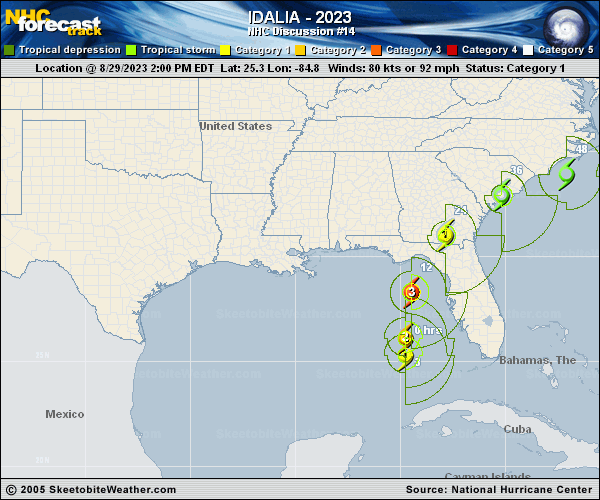
Official Discussion issued by the National Hurricane Center
Idalia (AL102023) DATA RELEASED: 8/30/2023 3:00:00 AM UTC
|
Copy of official data Hurricane Idalia Discussion Number 14 NWS National Hurricane Center Miami FL AL102023 1100 PM EDT Tue Aug 29 2023 Satellite and NWS radar imagery show that Idalia is becoming increasingly more organized. The eye on the Tampa WSR-88D is becoming better defined and the cloud pattern on GOES 16 imagery consists of a growing Central Dense Overcast with a strong convective band over the eastern semicircle of the circulation. Reconnaissance aircraft measurements show that the central pressure is steadily falling and is now around 958 mb. Flight-level and SFMR-observed winds along with Doppler velocity data from the aircraft support an intensity of 95 kt for this advisory. Idalia is now moving faster toward the north or slightly east of north with a motion estimate of 010/16 kt. The hurricane is moving between a mid-level trough over the northwestern Gulf of Mexico and ridge over the Bahamas and Greater Antilles. The system is expected to turn north-northeastward within the next 12 hours, make landfall along the northeastern Gulf coast, and then move northeastward to eastward on the southern side of a mid-level trough moving off the northeast U.S. coast. The 12-hour track forecast point for this advisory has been nudged a bit westward, a little west of the model consensus, but close to the latest GFS and ECMWF solutions. It should be noted that some credible models, i.e. the HAFS-A and HAFS-B predictions, are even a little father west. After landfall, Idalia is expected to move near or along the coast of Georgia and the Carolinas in 24-36 hours. Uncertainty in the track forecast beyond 48 hours remains quite large, with some of the global models turning Idalia southward, while some of the regional hurricane models show the storm moving out to sea. Given the uncertainties, the official track forecast shows a slow southeastward motion in 4 to 5 days. Based on the current strengthening trend and the favorable thermodynamic and oceanic conditions, significant strengthening seems likely up to landfall. The new official intensity forecast calls for Idalia to reach category 4 strength at landfall. This is fairly close to the HAFS And HWRF regional hurricane model simulations. After the center moves back over the Atlantic, significant restrengthening is not anticipated at this time due to the expectation of strong vertical west-southwesterly vertical wind shear. Dangerous winds are likely to spread well inland near the path of Idalia due to its relatively fast forward motion. KEY MESSAGES: 1. Catastrophic impacts from storm surge inundation of 12 to 16 feet above ground level and destructive waves are expected somewhere between the Wakulla/Jefferson County line and Yankeetown, Florida. Life-threatening storm surge inundation is likely elsewhere along portions of the Florida Gulf Coast where a Storm Surge Warning is in effect. Residents in these areas should follow any advice given by local officials. 2. There is the potential for destructive life-threatening winds where the core of Idalia moves onshore in the Big Bend region of Florida, with hurricane conditions expected elsewhere in portions of the Hurricane Warning area along the Florida Gulf Coast. Strong winds will also spread inland across portions of northern Florida and southern Georgia near the track of the center of Idalia where Hurricane Warnings are in effect. Residents in these areas should be prepared for long-duration power outages. Damaging hurricane-force winds are possible in portions of eastern Georgia and southeastern South Carolina where Hurricane Watches are in effect. 3. Areas of flash, urban, and moderate river flooding, with locally considerable impacts, are expected across the Florida Big Bend, central Georgia and South Carolina, through eastern North Carolina into Thursday. FORECAST POSITIONS AND MAX WINDS INIT 30/0300Z 27.7N 84.5W 95 KT 110 MPH 12H 30/1200Z 30.0N 83.9W 115 KT 130 MPH...ON COAST 24H 31/0000Z 32.3N 81.3W 70 KT 80 MPH...INLAND 36H 31/1200Z 33.5N 78.6W 50 KT 60 MPH...OVER WATER 48H 01/0000Z 33.8N 75.0W 50 KT 60 MPH 60H 01/1200Z 33.5N 72.5W 50 KT 60 MPH 72H 02/0000Z 32.9N 71.0W 45 KT 50 MPH 96H 03/0000Z 32.0N 69.4W 45 KT 50 MPH 120H 04/0000Z 31.0N 68.4W 45 KT 50 MPH $$ Forecaster Pasch |